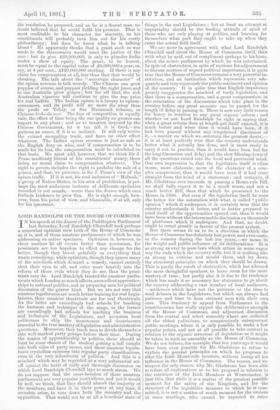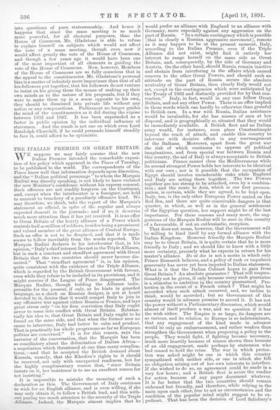LORD RANDOLPH ON THE HOUSE OF COMMONS.
IN his speech at the dinner of the Paddington Parliament last Saturday, Lord Randolph Churchill took perhaps a somewhat optimist view both of the House of Commons as it is, and of those amateur parliaments of which he was addressing an active specimen. Optimism is, however, in these matters at all events better than pessimism, for pessimists are too hopeless to effect any change for the better, though they brood painfully on everything that wants remedying; while optimists, though they ignore many of the mischiefs which demand a remedy, cannot entirely shut their eyes to all, and enter more heartily into the reform of those evils which they do see, than the pessi- mists ever do. Lord Randolph treated the amateur parlia- ments which London so much affects, as excellent apprentice- ships to national politics, and as preparing men for political discussion of the graver kind. But we are not sure that amateur legislatures are much better training for real Legis- latures, than amateur theatricals are for real theatricals. As the latter are exceedingly bad schools for teaching the business and technique of the stage, so the former are exceedingly bad schools for teaching the business and technique of the Legislature, and accustom local politicians to skip the monotonies and droarinesses essential to the true mastery of legislative and administrative questions. Moreover, they teach men to divide themselves into well-marked party groups before their time. During the season of apprenticeship to politics, there should at least be some chance of the student getting a full insight into both sides of party issues, and these amateur legisla- tures crystallise opinions into regular party classifications, even in the very schoolroom of politics. And this is a mischief which may be regarded as a very substantial set- off against the habit of early and thorough discussion on which Lord Randolph Churchill lays so much stress. We do not suppose that the cross-benches of these amateur parliaments are very popular institutions, and yet it would be well, we think, that they should absorb the majority of the members, and have it in their power at any time, if occasion arose, to vote down both the ministry and the opposition. That would not be at all a beneficial state of things in the real Legislature ; but at least an attempt at impartiality should be the leading attitude of mind of those who are only playing at politics, and learning for themselves what part they ought to take up when they enter the actual field itself.
We are more in agreement with what Lord Randolph Churchill said about the House of Commons itself, than with what he said, out of compliment perhaps to his hosts, about the mimic parliament by which he was entertained. In spite of obstruction, in spite of motions for adjournment to discuss matters of urgent political importance, it is quite true that the House of Commons remains a very powerful in- stitution, and an institution which represents very ade- quately and very vigorously the public sentiment and opinion of the country. It is quite true that English impatience greatly exaggerates the mischief of tardy legislation, and that there is a compensation, and a great compensation, in the reiteration of the discussions which take place in the country before any great measure can be passed, for the length of delay in passing it. There is now very little reason for hurry in relation to any great organic reform ; and whether or not Lord Randolph be right in saying that, when a great reform does at length get itself enacted, it is much better and wiser than it would have been, if it had been passed without any lengthened discussion of it,—a matter on which we entertain the greatest doubt,— it is at least perfectly true that the country understands better what it actually has done, and is more ready to carry it out in practice, than it would have been but for the long discussion and delay, and the slow filtering down of all the questions raised into the local and provincial mind. Our own impression is, that the legislation itself is often worse, more elaborate, more of the character of a com- plex compromise, than it would have been if it had come straight from the mind of a statesman ; and certainly, if Mr. Gladstone ever succeeds in passing a Home-rule Bill, we shall fully expect it to be a much worse, and not a much better Bill, than that which he presented to the House in 1886. But even if the legislation itself be none the better for the saturation with what is called " public opinion " which it undergoes, it is certainly true that the country understands it better, and is better prepared to avail itself of the opportunities opened out, than it would have been without the interminable discussion on thousands of platforms which it undergoes. And that, no doubt, ought to count greatly in favour of the present system. But there seems to us to be a direction in which the House of Commons has definitely lost power, and even caste, in the country during the last ten years,—we mean in the weight and public influence of its deliberations. It is as strong as ever to pass laws which attain in some vague way the ends which the country wills, but it is nothing like as strong to criticise and mould them, and lay down the structural principles on which they should be drawn. This is partly the result of obstruction, which has silenced the more thoughtful speakers, to leave room for the mere wasters of time ; but partly also it is due to the tendency which has made it so necessary for statesmen to go about the country addressing a vast number of local audiences, —audiences which have not the patience or the time to read debates in the Legislature, but which can always find patience and time to hear eminent men with their own ears. This tendency to appeal from Parliament to the constituencies has really sapped the deliberative strength of the House of Commons, and adjourned discussion from the central and select assembly where are collected all the ablest politicians, to comparatively unimportant public meetings, where it is only possible to make a few popular points, and not at all possible to take counsel in relation to the organic structure of legislation as it might be taken in such an assembly as the House of Commons. We do not believe, for example, that ten years ago it would have been even possible for Mr. Gladstone to refuse to explain the general principles on which he proposes to alter his Irish Home-rule measure, without losing all his influence in the House of Commons. The reason, and we suspect the only reason, why Mr. Gladstone has been able to refuse all explanations as to his proposal in relation to the retention of the Irish Members at Westminster, is just this, that while it is a matter of the greatest possible moment for the safety of the Kingdom, and for the structure of the legislative measure to which he is com- mitted, it is not a matter of much moment for the orators at mass meetings, who cannot be expected to enter into questions of pure statesmanship. And hence it happens that since the mass meeting is so much more powerful, for all electoral purposes, than the House of Commons, Mr. Gladstone is able to refuse to explain himself on subjects which would not affect the vote of a mass meeting, though even now it would affect greatly the vote of the House of Commons, and though a few years ago it would have been one of the most important of all elements in guiding the vote of the House of Commons. Now, however, Members of the House of Commons are so fully conscious that in the appeal to the constituencies Mr. Gladstone's personal bias is a matter of infinitely more importance than that of all his followers put together, that his followers do not venture to insist on his giving them the means of making up their own minds as to the nature of his proposals, lost if they were to make them up in a sense opposite to his own, they should be dismissed into private life without any notice or any compunctions. Parliament no longer guides the mind of the constituencies as it did during the regime between 1832 and 1867. It has been superseded as a factor in public opinion by the individual influence of statesmen. And the result is not one on which even Lord Randolph Churchill, if he could persuade himself steadily to face it, could afford to be optimistic.



































 Previous page
Previous page